2024 Plurality European Tour
The Future of Collaborative Technology & Democracy with Audrey Tang and Glen Weyl
21-31 May 2024
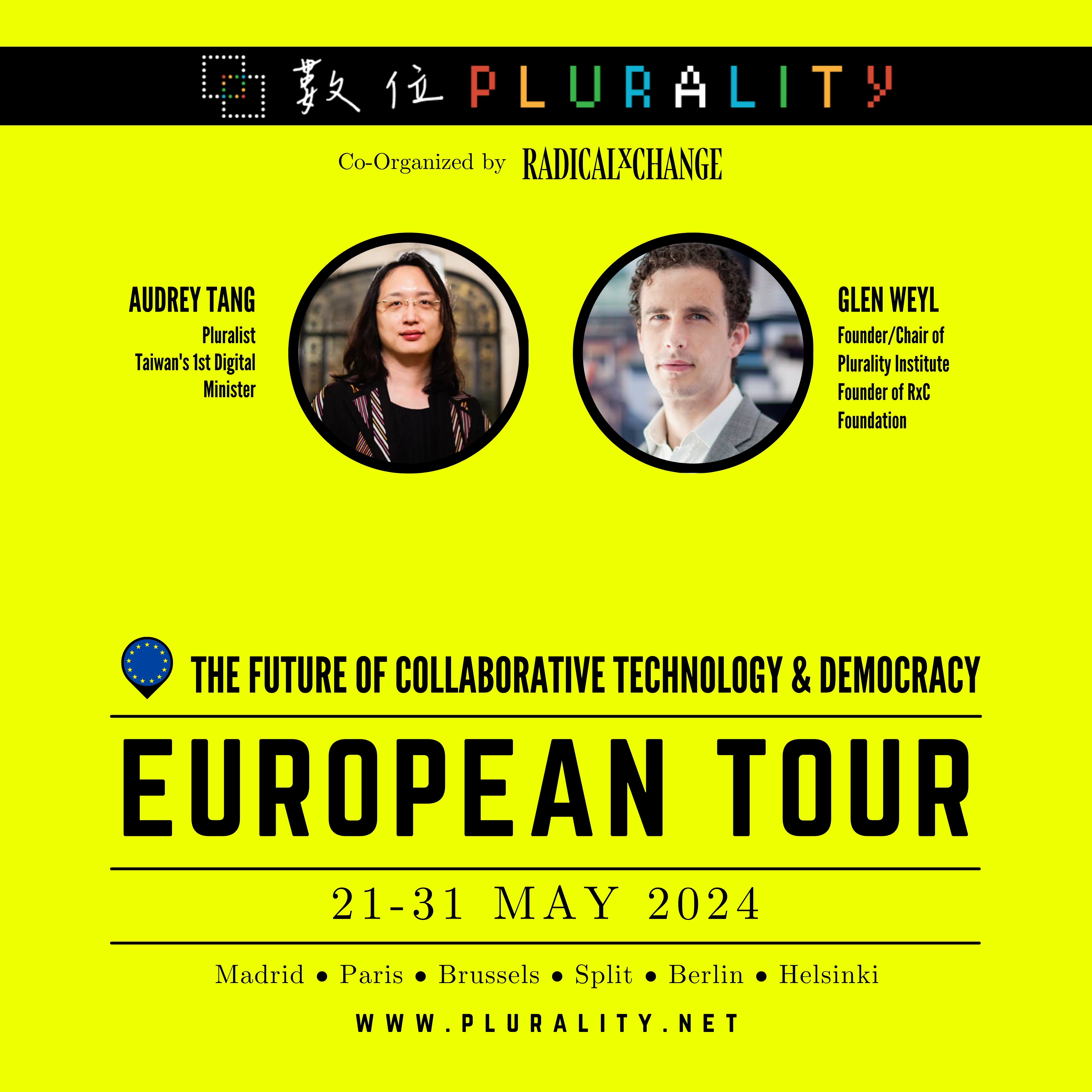
RadicalxChange Foundation co-organizes The Plurality European Tour alongside local partners and institutions. Over two weeks from May 21st to 31st, Audrey Tang and Glen Weyl, co-authors (along with the ⿻ Community) of ⿻ 數位 Plurality: The Future of Collaborative Technology and Democracy, are criss-crossing European capitals sharing their experiences, bringing together the RadicalxChange and Plurality communities, amplifying their voices, and catalyzing grass-roots initiatives.
Come join us!
Schedule Overview
-
- AI4Democracy Day, organized by IE University Center for the Governance of Change
-
22-23 May 2024 | Paris, France
-
Vivatech, part of the Internet and Democracy track
-
Sciences Po Paris, co-organized by the Tech and Global Affairs Innovation Hub and Bertelsmann Stiftung
-
-
24 May 2024 | Brussels, Belgium
- Panel discussion at ACE: Beyond Big Tech Regulation: Funding & Scaling Public Goods
-
- BlockSplit for the Digital Democracy Day
-
-
re:publica Conference
-
An invite-only event co-organized by Agora Digitale Transformation and Superrr Lab
-
-
31 May 2024 | Helsinki, Finland
- Events and workshops co-organized by MEP Miapetra Kumpula-Natri in collaboration with Sitra, Demos Helsinki, and Fact Bar
What is Plurality?
Plurality is the vision of a technology-focused future centered on collaboratively harnessing the energy of diversity to power social progress drawn from Taiwan, and the work of its first Digital Minister and the world’s first nonbinary cabinet minister, Audrey Tang.
⿻ 數位 Plurality is the first ever open-source, copyright-free, democratically self-governed, continually living argumentative book created by dozens of people worldwide with a coherent authorial voice.
Weeks away from the European parliamentary elections, Glen and Audrey are coming to discuss the future of democracy and how to protect it. You are invited to join us and re-enchant through wide-ranging discussions, informal meet-ups, and world-renowned conferences alongside eminent experts and voices.
From AI to Multilateralism, Inclusion and Participation, Open Technology & Democracy…From Madrid to Helsinki, from Paris to Berlin, we aim to explore a wide range of questions with as diverse communities as possible; thus charting as plural futures as possible!
Madrid
21 May 2024
AI4Democracy Day
Location: IE Tower
Time: 18:00 CEST
Join us on May 21 at the IE Tower in Madrid for AI4Democracy Day, an event that will bring together Alicia Combaz (founder and CEO of Make.org), Audrey Tang (first Digital Minister of Taiwan and one of “TIME100 Most Influential People in AI”), Glen Weyl (founder and Research Lead of the Plural Technology Collaboratory, a Microsoft Research Special Project) and other leaders who are using AI to enhance democracy.
In the context of an unprecedented election year, with about half of the world’s population heading to the polls, deepfakes, bots, and misinformation powered by AI pose a significant risk to the integrity of democracies worldwide. But AI can also empower citizens to shape their society.
In their latest book ⿻ 數位 Plurality, Tang and Weyl explain that AI systems should be based on democratic values such as transparency, explainability, plurality, and freedom. With the goal of promoting AI systems that champion democratic values and increase information sharing on this topic, the event will feature a series of short, interactive sessions with AI leaders.
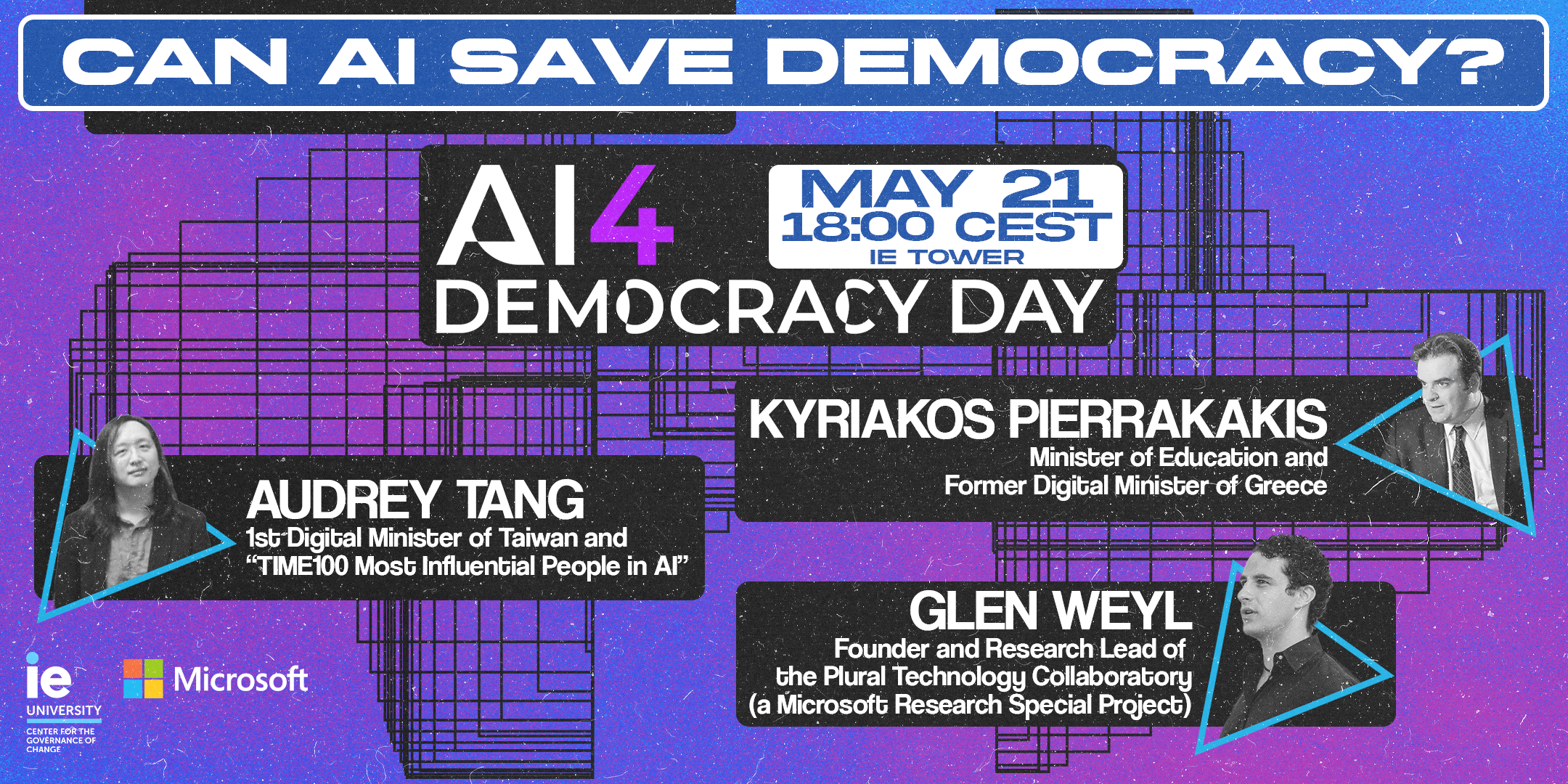
Paris
22 May 2024
VIVATECH
How Could Technology Help Us Renew Democracy?
Keynote: Glen Weyl and Audrey Tang
Location: Paris Expo Porte de Versailles, 1 Place de la Porte de Versailles
Time: 14h25 - 14h50
Stage 2
Join a thought-provoking dialogue with E. Glen Weyl, a visionary in reimagining market mechanisms and societal structures, and Audrey Tang, a trailblazer in government digital transformation. This session will explore the intersection of technology and governance, examining innovative approaches to enhancing civic engagement and public discourse. Engage with these pioneering thinkers as they share insights on creating more inclusive and participatory political ecosystems for the future. What role can technology play in revitalizing democratic processes? How might digital innovations reshape citizen participation and accountability? What strategies can bridge the gap between technology and democratic renewal?
23 May 2024
VIVATECH
What Does Democratic Tech Look Like?
Panel discussion with Audrey Tang and other technologists and activists
Location: Paris Expo Porte de Versailles, 1 Place de la Porte de Versailles
Time: 14h25 - 15h10
Stage 3
Amidst the backdrop of numerous elections unfolding worldwide, the intersection of technology and democracy takes center stage. From the risks of algorithmic biases, to concerns about surveillance, the need for technology that upholds democratic principles has never been more pressing. How can we ensure we design tech that empowers marginalized voices and fosters inclusion? How can it support citizens’ fundamental right to privacy? And how can governments develop frameworks that support these rights and values, rather than hinder them?
Sciences Po Paris School of International Affairs (PSIA)
Scaling collaborative technology to enable the future of multilateralism
Location: 28 rue des Saint-Pères, amphithéâtre Simone Veil.
Time: 17:00 CEST
The Technology and Global Affairs Innovation Hub of Sciences Po, the Bertelsmann Stiftung, and the RadicalxChange Foundation are happy to invite you to join an international conference on Scaling collaborative technology to enable the future of multilateralism. The event will take place on 23 May 2024 at 5pm on the campus of Sciences Po.
Conference Description
Amidst concerns about the disruptive effects of technology on global governance, our gathering seeks to highlight its transformative potential in fortifying the resilience of democratic systems. Taiwan stands as a beacon of innovation, harnessing agile technology to advance democracy, pluralism, and citizen well-being. Central to our discussions is the concept of “Plurality,” offering a framework to understand and maximize the benefits of technological progress.
In this critical juncture for democracy, mid-way through this year punctuated by elections around the globe, we raise essential questions: How can we reconcile the existential challenges posed by technology with our democratic values? What new technological architectures can we forge to enhance international dialogue and cooperation? Drawing from local deliberative and participative democratic experiences, how can we cultivate global cooperation in an increasingly interconnected world?
Brussels
24 May 2024
Public Interest Digital Innovation Panel Discussion
Beyond Big Tech Regulation: Funding & Scaling Public Goods
Location: ACE Venue (Avenue d’Auderghem 22, B-1040 Brussels) and ONLINE
Time: 15.00 - 17.00 CEST
- Glen Weyl (RxC Foundation, Plurality Institute)
- Audrey Tang (Taiwan’s first Digital Minister)
- Francesca Bria (Italian Innovation Fund, UCL IIPP)
- Amba Kak (AI Now Institute Exec Director)
- Meredith Whitaker (President of Signal Foundation)
- Pierce O’Donohue (Future Networks Directorate DG Connect)
- Adriana Groh (Sovereign Tech Fund)
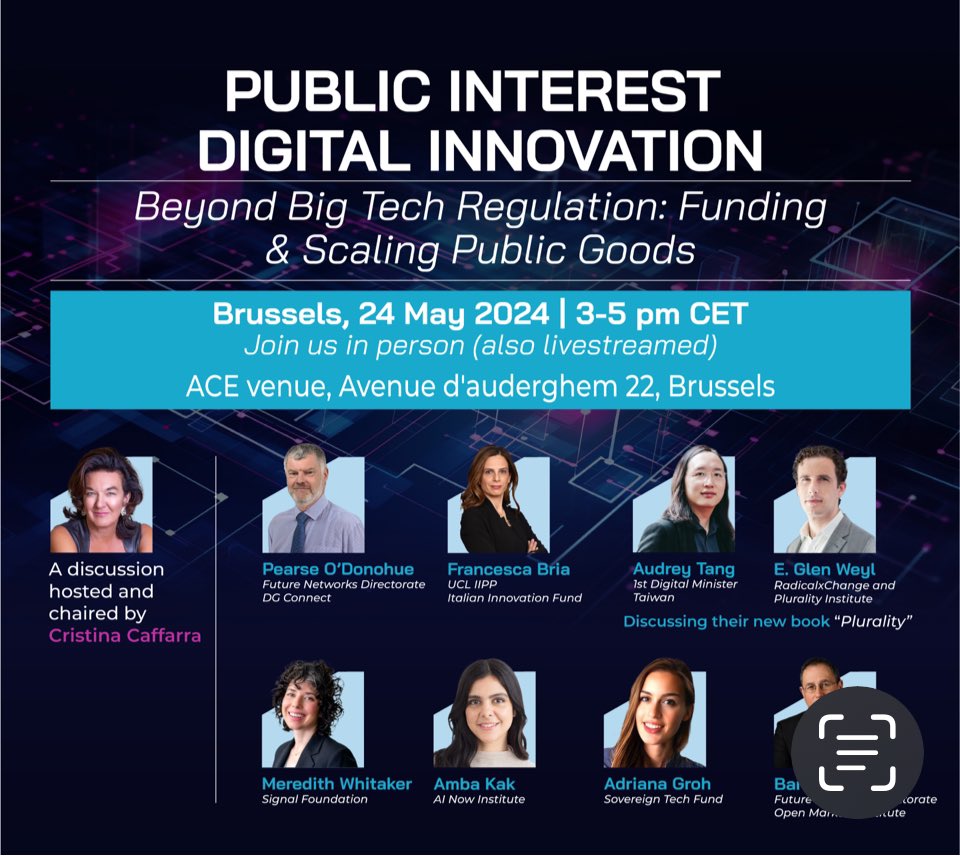
Split
27-28 May 2024
BlockSplit: Digital Democracy Day | PLURALITY
Location: AC Hotel by Marriott Split Time: 16:00 - 19:00
Plurality, Digital diplomacy & Regulation
Dive deep into the future of interconnection of collaborative technology and plural democracy.
About Plurality
The concept of plurality, encompassing democracy, technology, and social progress, highlights the interconnectedness and diversity within human societies.
Plurality promotes a flexible and adaptive approach, leveraging technology to facilitate meaningful interactions and collective decision-making.
This event will expand beyond regulation and explore innovative solutions for democracy.
This is the 3rd part of our Digital Democracy Day.
A unique event where Web3 builders, legal experts, European regulators, and policymakers meet to explore topics such as digital diplomacy, plurality, crypto regulation, and digital identity, fostering insightful discussions and collaborations at the intersection of technology and governance.
What is digital democracy?
Digital democracy refers to the use of digital technologies in order to engage citizens in democratic processes. It encompasses various tools and platforms that enable citizens to communicate with government officials, express their opinions, participate in decision-making processes, and access information about public policies and issues.
A key component of digital democracy is plurality, which emphasizes the importance of embracing diversity and complexity in democratic societies, leveraging decentralized technology and innovative approaches to foster collaboration, progress, and social cohesion.
How to Participate
This event is invitation only. It’s intended for thought and political leaders, regulators and experts in democracy and web3 governance, decision making and privacy.
Check out the BlockSplit Agenda.
Berlin
29 May 2024
Plurality: The Future of Collaborative Technology and Democracy Location: STATION Berlin, Luckenwalder Str. 4-6 10963 Berlin Time: 11:45 -12:15
Re:publica is one of the world’s largest conferences on digital culture. Media professionals, entrepreneurs, and academics share their knowledge and discuss the future of the information society.
Digital technology threatens to tear apart free and open societies through polarization, inequality, loneliness, and rights abuses. But on a delicate, diverse, and politically divided East Asian island, things seem different. In the decade since the weeks-long occupation of Taiwan’s parliament, this island of resilience achieved inclusive, technology-fueled growth, overcame the pandemic without lockdowns and the infodemic without takedowns, and entrusted the people to tackle shared challenges like environmental protection while capitalizing on a culture of innovation to “hack the government.”
Audrey Tang and Glen Weyl are interviewed by Frederike Kaltheuner to discuss the framework that they developed as part of their book “Plurality: The Future of Collaborative Technology and Democracy”.
Plurality is an approach to using digital tools that is attempting to channel the energy of social diversity into progress instead of conflict and shared growth instead of widening inequality. It’s a framework that aims to enable collaboration across social differences, for example by empowering large numbers of people to express meaningful views on a complex issue and reach consensus rather than splitting into factions. The goal is to offer tools to radically enrich society while leaving no one behind.
Fireside Chat – Plurality: Technology for Collaborative Diversity and Democracy
Location: Wikimedia Deutschland e. V., Tempelhofer Ufer 23/24, 10963 Berlin
Time: Doors Open: 14:30 | Fireside Chat: 15:00 - 17:30 | Get-Together: 17:30 - 18:00
Jointly organized and hosted by Agora Digitale Transformation, SUPERRR Lab, RadicalxChange Foundation, and Wikimedia Deutschland.
There is a limited number of seats available, please inquire with RadicalxChange team for availability.
Drawing on their new book titled “⿻ 數位 Plurality” which will be published on May 20 2024, we will talk with Audrey Tang and Glen Weyl about how the relation between democracy and digital technology has changed over the past decades and what they envision for the future. And most importantly: How can we get there?
Format: Our conversation features Audrey Tang, Taiwan’s first digital minister (2016-2024), and Glen Weyl, a researcher and founder of RadicalXChange. The conversation will begin with a segment moderated by Stefan Heumann from Agora Digitale Transformation and Julia Kloiber from Superrr Lab. Following this, we will open the discussion to the audience, allowing them to participate and ask questions. The event will adhere to Chatham House Rules. After the fireside chat, attendees are invited to a get-together with snacks and drinks.
The goal is to foster a real conversation and engagement rather than a sequence of statements on different topics. We will seek to structure the question and the conversation in a way that both Audrey and Glen can engage with their respective perspectives.
Helsinki
31 May 2024
How to harness technology for inclusion, participation, and democracy?
Location: Demos Helsinki, Mechelininkatu 3D, Helsinki and ONLINE
Time: 09:00 - 11:00 CEST
The event is part of Plurality European Tour and is organized in collaboration between MEP Miapetra Kumpula-Natri, Sitra, and Demos Helsinki. The event is held in English.

We warmly invite you to join us to discuss the future of democracy with only one week to go before the EU parliamentary elections. The keynote speakers of the event include the first Digital Minister of Taiwan, Audrey Tang, and Founder of RadicalxChange, the Plurality Institute, and Microsoft Research’s Special Project ‘the Plural Technology Collaboratory’, Glen Weyl.
The former Minister of Digital Affairs of Taiwan, Audrey Tang, has, with her collaborators, achieved inclusive, technology-fueled growth that harnesses digital tools for strengthening both social unity and diversity. Together with Glen Weyl, she has published the book ‘⿻ 數位 Plurality: The Future of Collaborative Technology and Democracy’, which offers tools for radically enriching relationships while making sure no one is left behind. Her ideas promise to transform every sector from health care to media, as illustrated by the way the book has been written: as a chorus of open, self-governing collaboration of voices from around the globe.
The event Audrey Tang and Glen Weyl open up the key content of the book, which is followed by on panel with the experts of digital democracy.
About ⿻ 數位 Plurality: The Future of Collaborative Technology and Democracy
A vision of the future of technology focused on collaboratively harnessing the energy of diversity to fuel social progress drawn from the world’s most successful digital society, Taiwan, and the work of its Digital Minister and the world’s first transgender minister, Audrey Tang.
Hard copies of the book will be available for purchase on 20 May 2024.
The e-copy is free to read and download on plurality.net
About Audrey Tang
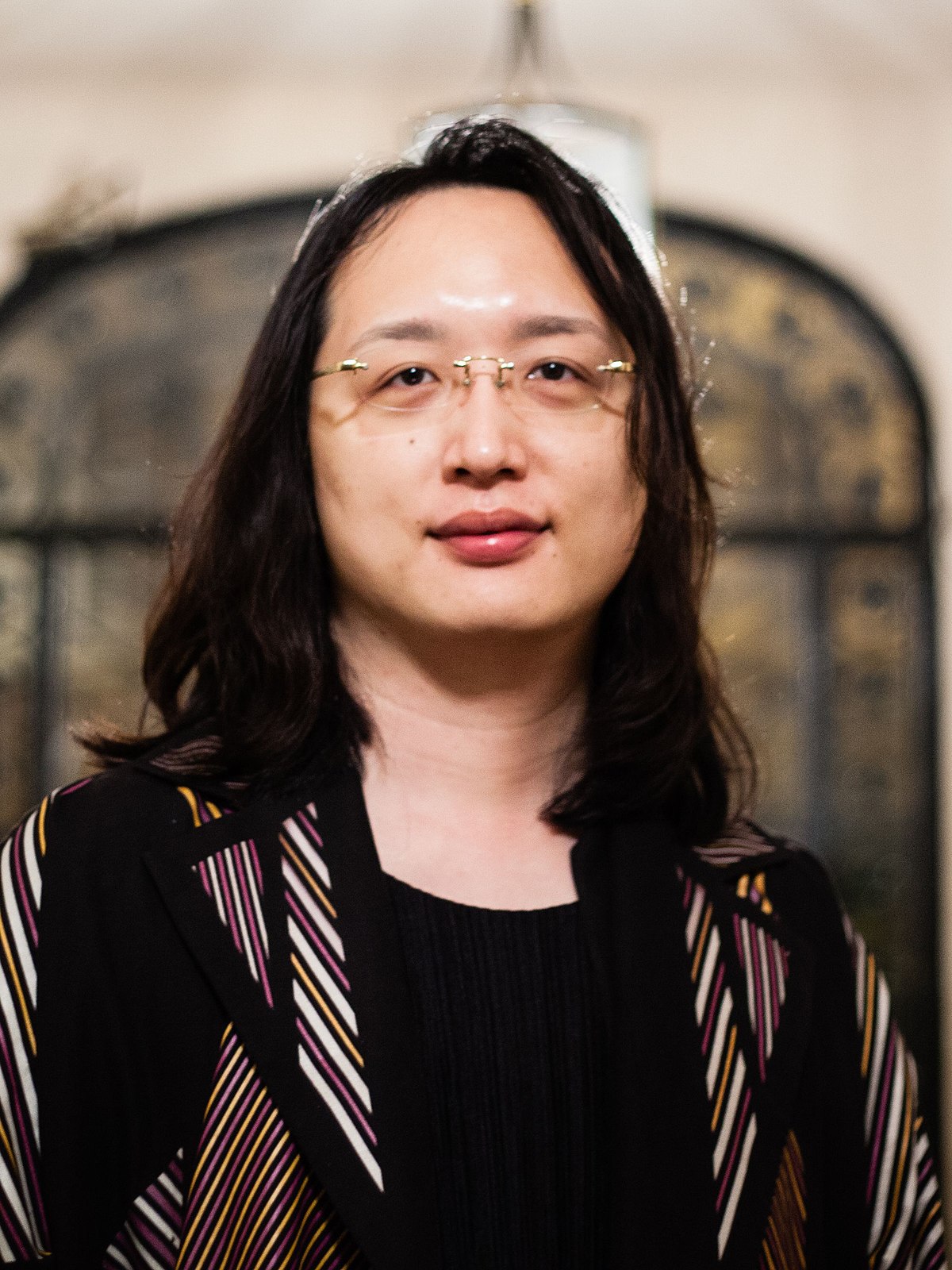
Named to “TIME100 Most Influential People in AI”, Audrey Tang served as Taiwan’s first Digital Minister and the world’s first nonbinary cabinet minister. As a child, Tang practiced Taoism to moderate all strong emotions to survive a cardiac condition. After attending 10 educational institutions in 10 years, Tang left formal schooling to pursue self-education at age 14. In her 20s, Tang rose to prominence as a leader in free and open-source software, revitalizing the Haskell and Perl programming languages. During her 30s, Tang played a crucial role in shaping g0v (gov-zero), one of the most prominent civic tech movements worldwide. In 2014, Tang helped broadcast the demands of Sunflower Movement activists, and worked to resolve conflicts during a three-week occupation of Taiwan’s legislature. Tang became a reverse mentor to the minister in charge of digital participation, before assuming the role in 2016 after the government changed hands. Tang helped develop participatory democracy platforms such as vTaiwan and Join, bringing civic innovation into the public sector through initiatives like the Presidential Hackathon and Ideathon. Her other accomplishments include shaping Taiwan’s internationally acclaimed COVID-19 response, as well as safeguarding its 2024 presidential and legislative elections from foreign cyber interference.
About Glen Weyl
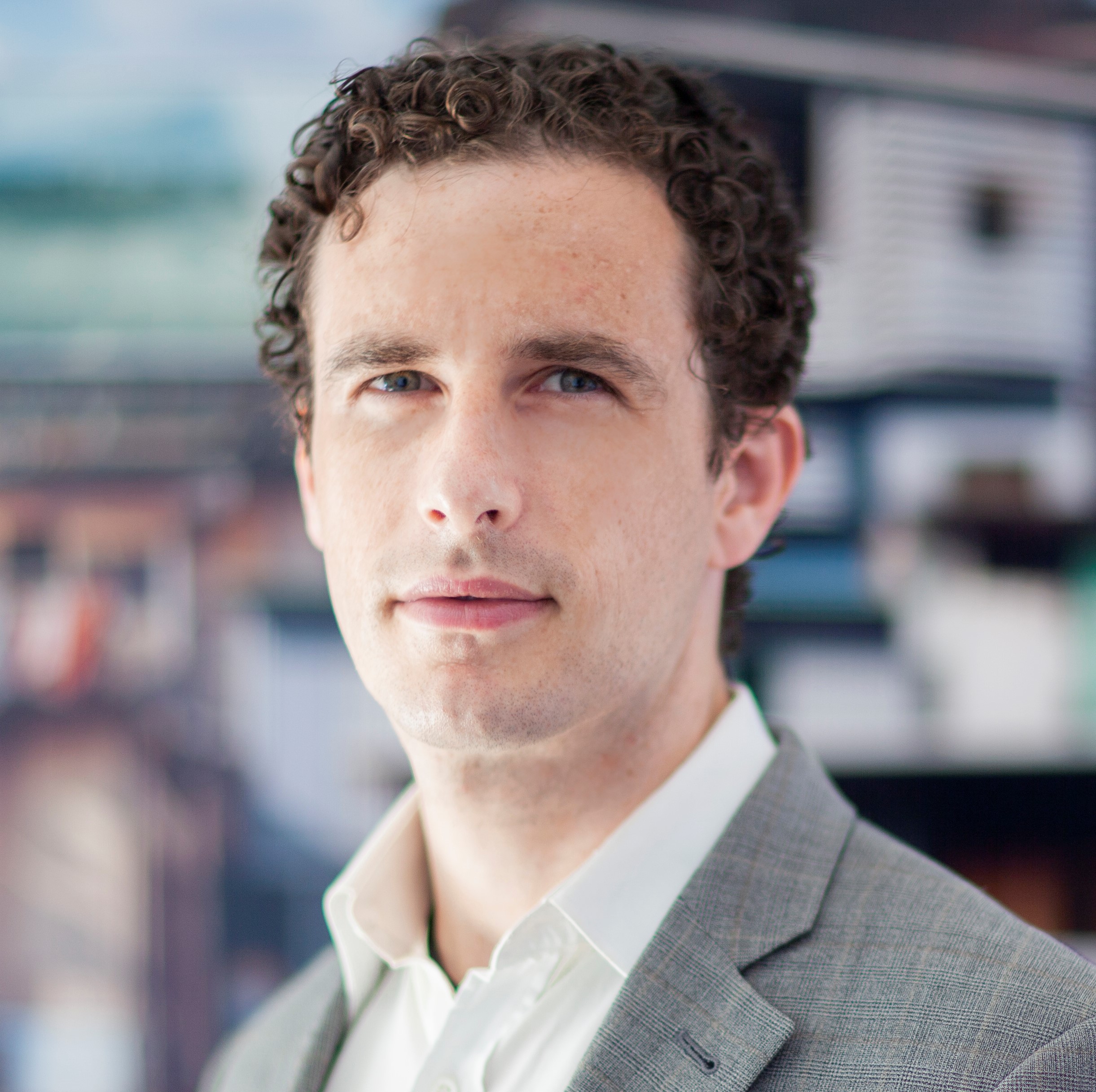
Glen Weyl is a co-founder and the Chair of Plurality Institute, the Research Lead of Microsoft Research’s Plural Technology Collaboratory, Founder of RadicalxChange Foundation, and co-author of Radical Markets and ⿻ 數位 Plurality: The Future of Collaborative Technology and Democracy. He was Valedictorian of Princeton University in 2007, received his PhD in economics from the same in 2008, was a Junior Fellow of the Harvard Society of Fellows, an Alfred P. Sloan Fellow and has taught economics at University of Chicago, Princeton, Harvard and Yale.
About RadicalxChange
RadicalxChange Foundation is a 501©(3) nonprofit organization dedicated to democratic innovation and institutional design through operational partnerships and experimental projects between academia, government, art, technology, and beyond.
